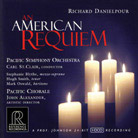April 2002
~Richard Danielpour When I first read these words of dedication on the back of this new Reference Recordings release, my reaction was one of suspicion. The emotionally charged requiems of Mozart and Berlioz have always ranked among my favorite works. I was afraid I might be in for a quickly penned sympathy piece. I couldn’t have been more wrong. Born in 1956, Richard Danielpour is already one of the most respected composers of our time. Among his impressive credits thus far are Voices of Remembrance, a concerto for the Guarneri String Quartet; Celestial Night, a symphony which celebrated the new home of the New Jersey Symphony; and Through the Ancient Valley, a new cello concerto for Yo-Yo Ma and the New York Philharmonic. Any composer could be proud to have amassed such credits during his lifetime. Danielpour is still in his 40s. A requiem, by definition, is a tribute or prayer to the deceased. Danielpour’s motivation for writing his requiem began in 1998 when he began communicating with veterans. He soon realized how disconnected he was with their experience. In the composer’s words, "I had completely bypassed anything having to do directly with the experiences that had shaped, and in some ways, defined the lives of these servicemen." In An American Requiem, Danielpour explores the human as well as the spiritual experience of war. In his desire to explore the philosophical as well as the private issues of war, Danielpour uses a rather interesting technique. The Latin text of the Roman Catholic Requiem Mass -- sung by the chorus and representing a "spiritual dimension" -- alternates with text taken from poems by Whitman, Emerson, Michael Harper, and H. D. (Hilda Doolitle). Sung by soloists or small ensembles, these poems convey a more personal experience. The music accompanying the words seems haunting, if not almost familiar at times. The tempos add yet another dimension -- time -- to encompass the complete emotional journey of life, war, and death. The Pacific Symphony Orchestra never overshadows the chorus or soloists, which is as it should be. All of the soloists are outstanding. I was especially captivated by the baritone, Mark Oswald. We hear so much about tenors these days. It’s nice to recognize other ranges as well. The recording is typical Professor Johnson: detailed, rich, immediate. The soundstage incredibly deep and wide. I have yet to mention any connection to that dark day last September. Although An American Requiem was written before those events took place, there are passages that seem to foreshadow them. Perhaps the most haunting are Whitman's words: "On the pavement here, and there beyond it is looking, Down a new-made double grave." GO BACK TO: |
 Richard Danielpour - An American Requiem
Richard Danielpour - An American Requiem![[Reviewed on CD]](../format/regcd.gif) "To
the memory of those who died in the wake of the tragic events of September 11, 2001: and
in tribute to the American Soldier -- past, present and future"
"To
the memory of those who died in the wake of the tragic events of September 11, 2001: and
in tribute to the American Soldier -- past, present and future"